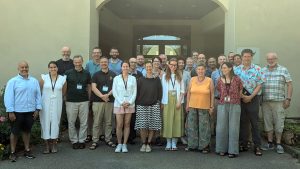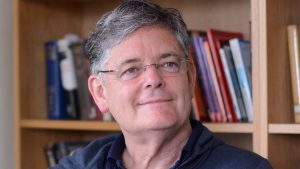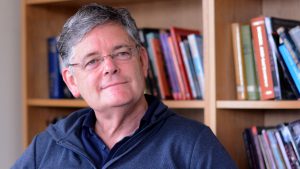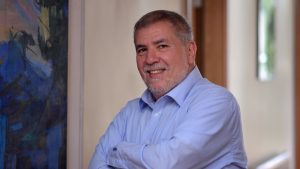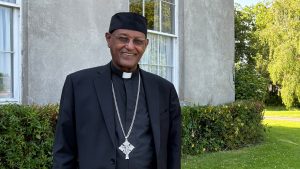Prophetic boldness needed in refugee crisis

Jesuit educators were urged to action at a seminar for refugees at the Emmaus Centre in Swords, Dublin on 26 – 28 April 2017.
“Go to the frontiers” urged Pope Francis to members of the Society of Jesus in Rome last year. At the seminar held in Dublin entitled, ‘From Access to Integration’, Jose Ignacio Garcia SJ, Director of the Jesuit Refugee Service (JRS) Europe observed, “The frontiers have moved into our classrooms.”
Best practice explored
The seminar, organised by the Jesuit Education Desk, Ireland and Jesuit European Community for Primary and Secondary Education (JECSE), in collaboration with JRS Europe, brought together Irish and European delegates from both the education and social apostolates.
It afforded participants the opportunity to deepen their understanding of the educational experiences of migrants and refugee students; consider approaches required to foster greater access for migrants and refugees to Jesuit schools and cultivate more effective integration in our schools. Further, it created a space where those who attended could reflect and share their experiences of working with such children and young people.
In his keynote address, Msgr. Anthony J. Figuerido of the Vatican Dicastery for Integral Human Development, Migrants and Refugees Section, summoned all Jesuit educators to ‘prophetic boldness’ in ‘service to migrant and refugee students’.
People are on the move worldwide. The increasing migratory movement is evident in the diverse make up of students within classrooms in many countries. Dr. Krizan Vekic, co-ordinator of the Education for Justice and Reconciliation Programme, Jesuit Schools, Ireland, gave participants an international perspective on the distribution of migrant and refugees students across schools in Europe, Australia, and the United States.
Drawing on case studies, he showed how, once given access to education, children and young people work extremely hard and achieve well. Dr. Vekic added that many migrant and refugee students have what researchers have coined ‘a dual frame of reference’. Thus, coming from situations with little hope of gainful futures, students seize the opportunity to progress in education, with commitment and dedication.
Ms Mary Kenny, English for Speakers of Other Languages (ESOL) Development Officer with the Dublin and Dun Laoghaire Education Training Board explored the importance of language learning. She informed those present of the policies and procedures in Ireland for teaching and tracking achievement in students for whom English is not the first language. Equally, the significance of all second-level subject teachers to assisting students in language learning was highlighted. This, coupled with ‘regular focused’ assistance, helps migrant and refugee students attain a higher competency in the language of their new country.
Challenges ongoing and overcome
Language learning is only one of many challenges facing students from families living in ‘direct provision’ in Ireland. David Moriarty of JRS Ireland laid out the severe and harsh shortcomings for some 4,500 asylum seekers presently residing in ‘direct provision’ accommodation settings. It is a system apparently designed to discourage people from seeking asylum in Ireland.
Mr Gerry Cullen, past pupil of Jesuit Belvedere College, Dublin, now principal of a multi-ethnic DEIS girls’ school in Dublin spoke of the positive impact the enrolment migrant and refugee students had on his school over the last 15 years.
He explained that the school’s approach to care, the willingness of staff to learn from best practice and the school’s disposition to always focus on meeting the educational and developmental needs of their students, meant that the school has gone from strength to strength in terms of raising student numbers, their expectations and their academic achievement. Sixty per cent of the school’s young women graduates now go on to third level to study an array of courses; medicine, law, engineering, education and technical disciplines.
Collaboration is key
A disconnect between the Jesuit Social and Education Apostolates was identified by Jose Ignacio Garcia SJ during his presentation. At the seminar, the diverse sharing of information on and experience of the social and educational requirements of young refugees and migrants emphasised the overlapping concerns and areas of work within the two apostolates. The necessity for those engaged in and passionate about social justice to collaborate and bring their diverse skills to the issues was clear.
“Be it in Ireland or elsewhere in Europe, a key takeaway from the seminar for myself,” says participant Carol Maxwell, “was that strategic collaboration between the apostolates could assist these young students in ensuring they had access to our Jesuit schools and were effectively integrated into whichever country they eventually settled.”
The event was organised by Dr. Krizan Vekic and Mr. Brian Flannery, the Education Delegate for the Irish Jesuit Province. It follows on from a seminar held last year in Brussels. Other speakers who presented at the seminar included Mr Enda O’Neill, Head of Office Designated and Official, UNHCR Ireland. Such is the importance of this theme for Europe that JECSE envisages planning similar events and initiatives in the future.







